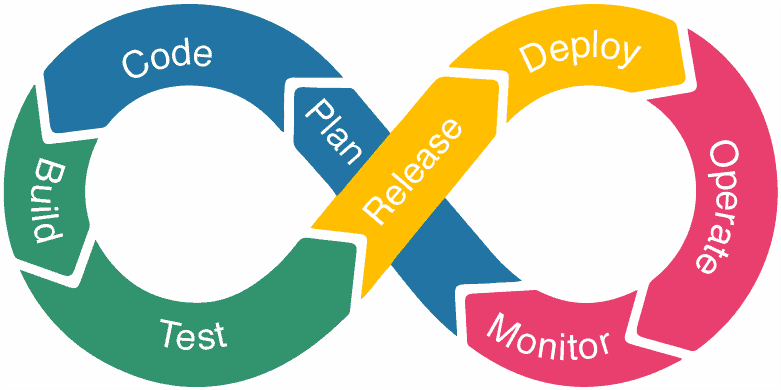Learn through the super-clean Baeldung Pro experience:
>> Membership and Baeldung Pro.
No ads, dark-mode and 6 months free of IntelliJ Idea Ultimate to start with.
Last updated: February 6, 2024
DevOps and Site Reliability Engineering (SRE) are two prominent methodologies that have emerged in the field of software development. Both aim to improve the efficiency and reliability of software systems but have different approaches and focus areas.
In this tutorial, we’ll explore the differences between DevOps and SRE.
DevOps is a set of practices that combines software development (Dev) and IT operations (Ops) to promote collaboration and streamline the software delivery lifecycle. Also, it aims to improve cooperation between development and operations teams, foster continuous integration and delivery (CI/CD), and automate processes.
Let’s take a look at the life cycle of DevOps, starting with the planning phase:

First, teams come together to strategize and outline their collaborative approach. Then, as the development phase commences and the automation and continuous integration come into play, streamlining the process.
Afterward, during the testing and deployment stages, continuous delivery ensures frequent and reliable releases. Once operational, the system undergoes continuous monitoring, allowing for prompt issue detection and resolution.
Finally, the cycle circles back to planning, as feedback and insights from monitoring drive iterative improvements for the next cycle.
So, DevOps is about an adaptive, fast, automated, and collaborative approach to delivering and maintaining a software product.
Google introduced Site Reliability Engineering (SRE), a powerful model for reliable software systems. With an unwavering focus on system reliability, SRE employs Service Level Objectives (SLOs) and the innovative concept of error budgets to balance innovation and stability.
SLOs define specific performance targets that a service should meet to ensure a desired level of quality and reliability. On the other hand, error budgets represent the permissible amount of service disruptions or errors that can occur while still meeting SLOs. Those concepts are commonly used in the context of managing and maintaining the reliability and performance of software systems and services. They are particularly important in the field of SRE and DevOps practices.
Through comprehensive monitoring and swift incident response, SRE remains ever watchful, promptly detecting and mitigating issues. After each incident, post-incident analyses drive continuous improvement and learning from failures.
So, the best practices of SRE are:

In SRE, we combine engineering skills and operational expertise to build rock-solid software. Automation frees us from mundane tasks and gives us more efficiency. Moreover, we manage risks by setting reliability goals and error budgets, ensuring a balance between innovation and stability.
When deciding between DevOps and SRE for our organization, careful consideration of various factors is crucial. Firstly, if we operate in a fast-paced and rapidly evolving market where the speed of development is of utmost importance, DevOps should be our choice. DevOps advocates for collaboration and automation, allowing teams to iterate quickly and deliver features at a rapid pace.
On the other hand, if our organization deals with mission-critical systems where reliability and uptime are paramount, SRE could be the more suitable option. SRE places significant emphasis on system reliability, resilience, and operational expertise, ensuring uninterrupted service even in challenging situations.
Another factor to weigh is the level of risk tolerance within our organization. DevOps focuses on minimizing risks through the implementation of practices like continuous integration, automated testing, and deployment pipelines.
Lastly, we should consider the scalability and complexity of our systems. DevOps offers scalability by leveraging automation and infrastructure-as-code practices, which enable efficient management of large-scale deployments. This consideration is vital for organizations with complex and ever-growing software systems. By thoroughly evaluating these factors, we can make an informed decision on whether DevOps or SRE aligns best with our organization’s specific needs and goals.
Let’s check the differences between DevOps and SRE across various criteria:
| Criteria | DevOps | SRE |
|---|---|---|
| Focus | Collaboration, Automation, Reliability, Resilience | Agility, Operational Expertise |
| Monitoring | Continuous Monitoring, Robust Monitoring | Prompt Issue Resolution, Post-Incident Analysis |
| Reliability Metrics | Stability, High Uptime, Error Budgets | Minimal Disruptions, Performance Measurement |
| Risk Management | Minimize Risks, Early Error Budgets | Issue Identification, Performance |
In this article, we explained DevOps and SRE and discussed their respective strengths.
DevOps emphasizes collaboration, automation, and agility to streamline the software delivery lifecycle. On the other hand, SRE prioritizes reliability, resilience, and operational expertise, aiming to establish and maintain highly dependable software systems.